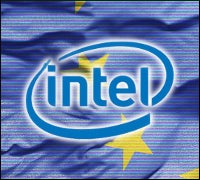 |
The European Commission went public today with details of its antitrust
investigation against Intel that resulted in a 1.06 billion euro ($1.6 billion) fine against the chipmaker earlier this year.
The charges in the long-running investigation first came to light in May, when the EC slapped Intel with the fine, which it’s now appealing. But this week marks the first time the EC publicly provided some evidence to back up its findings.
The EC said Intel engaged in two type of illegal practices to exclude or
limit competitors in the x86 market — chiefly AMD, which is separately suing Intel over allegations of anticompetitive activity.
Specifically, the EC charged that Intel implemented a series of conditional rebates to computer manufacturers and a European retailer, offering price breaks for not using AMD chips.
The other charge is that Intel (NASDAQ: INTC) used so-called “naked
restrictions” to prevent or delay the launch of computers based on competing
chips.
AMD (NYSE: AMD) was quick to issue a statement trumpeting the release of
the EC’s report.
“This is the first time that Intel has had to confront now publicly available facts of its illegal behavior and it won’t be the last,” said AMD’s executive vice president of legal affairs, Tom McCoy.
McCoy pointed to investigations into Intel’s competitive activities by the U.S. Federal Trade Commission and the New York State Attorney General, and said the cases, along with its own suit against the chipmaking giant, would “provide other clear demonstrations of Intel breaking the law.”
But Intel repeated earlier claims that the EC chose to ignore exculpatory
evidence.
“There is nothing new here,” Intel said in an e-mail to InternetNews.com. “This decision reflects the underlying bias we have come to expect from the case team that ran this investigation. We are convinced that the Commission’s conclusions regarding our business practices are wrong, both factually and legally.”
“Intel is committed to ethical business behavior and compliance with all
applicable laws and regulations governing business practices,” the company said. “We are convinced that we’ve adhered to those standards and acted legally at all times in this matter.”
Intel also said that the EC relied heavily on speculation found in e-mails
by lower-level employees that didn’t participate in the final negotiations
with computer makers.
Specifically, the EC release details several examples of internal e-mails
from Dell, HP and others that show what it maintains is illegal behavior.
For example, the EC said Intel rebates to Dell from December 2002 to
December 2005 were conditional on Dell purchasing exclusively Intel CPUs.
In an internal Dell presentation from February 2003, Dell noted that should it switch any part of its CPU supplies from Intel to its competitor AMD, Intel
retaliation “could be severe and prolonged with impact to all [Lines of
Business].”
In a February 2004 e-mail on the consequences of the possible purchase by
Dell of AMD CPUs, a Dell executive wrote:
“Boss, here’s an outline of the framework we discussed with Intel … Intel is ready to send [senior and non-senior executives] to meet with [Dell senior and non-senior executive] … Background: [Intel senior executives] are prepared for [all-out war] if Dell joins the AMD exodus.
We get ZERO MCP [rebates] for at least one quarter while Intel ‘investigates the details’ (…) We’ll also have to bite and scratch to even hold 50%, including a commitment to NOT ship in Corporate. If we go in Opti [Dell product series for corporate customers], they cut it to < 20% and use the added MCP to compete against us."
Among other examples, the EC said Intel rebates to HP from November 2002 to May 2005 were conditioned in particular on HP purchasing no less than 95 percent of its CPU needs for business desktops from Intel. The remaining 5 percent that HP could purchase from AMD was then subject to further restrictive conditions, the EC added.
Illegal or hardball?
Chip analyst Fred Zieber, founder and president of Pathfinder Research admits to a
certain “Silicon Valley point of view” when it comes to the case, but isn’t
sure Intel has done anything illegal.
“Here is a company that has consistently brought down prices and increased
performance,” Zieber told InternetNews.com. “Now the EU is banging on
them for hardball sales tactics, but what do they want? Do they want Intel
to not sell chips in Europe or to keep a stable price and not improve the
product?”
Still, Zieber conceded Intel has likely changed its sales and marketing
practices as a result of the various charges and suits.
As the cases in Europe and the U.S. move forward, he doesn’t think it will
affect consumers or IT managers’ decisions of what systems to buy, but it
could affect suppliers.
“Will it influence companies like Dell and HP? They might become more circumspect in how they deal with Intel,” he said.
“And most importantly, from their point of view, they want to keep AMD
alive and strong, particularly in the consumer and retail areas.”


